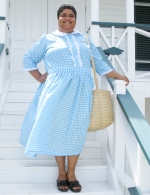Connecting kids to culture
 (CNS): Nasaria Chollette, Education Officer with the National Museum, is spending the summer sharing Cayman’s cultural heritage with the younger members of the community. Commencing a busy round of cultural activities, Chollete is taking on on the character of “Miss Nas Museum Guru” this week to appear at the Cayman National Cultural Foundation’s (CNCF) summer camp. The camp is part of a Museum drive towards enriching cultural experiences and strengthening their preservation. ‘Miss Nas’ is also scheduled to appear on CITN’s Kidz Stuff programme; she is working on a “Sands of Cayman” exhibition; and she has proposed a “Cultural Cayman” package as part of the induction programme for teachers new to the Islands.
(CNS): Nasaria Chollette, Education Officer with the National Museum, is spending the summer sharing Cayman’s cultural heritage with the younger members of the community. Commencing a busy round of cultural activities, Chollete is taking on on the character of “Miss Nas Museum Guru” this week to appear at the Cayman National Cultural Foundation’s (CNCF) summer camp. The camp is part of a Museum drive towards enriching cultural experiences and strengthening their preservation. ‘Miss Nas’ is also scheduled to appear on CITN’s Kidz Stuff programme; she is working on a “Sands of Cayman” exhibition; and she has proposed a “Cultural Cayman” package as part of the induction programme for teachers new to the Islands.
“The reason I created the ‘Miss Nas’ character is that I wanted to appeal to younger children,” says Chollette, pointing to a felt need to overcome a level of disconnect with Caymanian culture among the younger set. “And I wanted learning to be fun,” she added in a release from the Museum.
At the CNCF summer camp Miss Nas Museum Guru is teaching creative writing with a cultural flair. The camp, which has as its theme ‘Pass it Down’, features local artisans and artists, seeking to pass on traditional arts and crafts, such as crocheting and quadrille, among other indigenous creative activities.
For her role at this week’s CNCF summer camp, Miss Nas is “digging” for stories passed down through families for elaboration by the children. “I am having the students collect stories from their families so they can create their own story books with illustrations,” she says.
For her CITN Kidz Stuff appearance scheduled to be aired later this summer, Miss Nas was filmed at a Colliers, Gun Bay, location, where the cockspur vine is plentiful. The subject of her segment was the seed of the cockspur, known to generations of Cayman’s children as ‘Nickas’. The Cayman cockspur seed is commonly grey, though some rare ones boast an orange yellow hue. The colour and look of the seeds vary from country to country, coming in such exotic patterns as polka dots and stripes in other places.
Traditionally, Nickas have fascinated children because the seeds become hot when stroked in rapid succession against a solid surface. They are also used locally as the pawns in a board game variously called “Wauri” and “Mancala.” “It is really a ‘mind game’, or a ‘strategy game,’ if you will,” explains Chollette, and the game seems to have been passed down in some families over several generations.
Children across the three islands are also busy preparing for the Sands of Cayman project. Miss Nas provided information, which teachers have incorporated into their curricula. Plans are that when schools re-open in September the children will display sand of varioustextures and colours, relating them to specific locations across the Islands. The sand samples will be exhibited in clear, Plexiglas tubes.
As part of another project in preparation for September’s school opening, Chollette has proposed a “Cultural Caravan” as an aspect of the Education Department’s annual teacher induction programme. The new teacher cultural tour package involves a one-day excursion around the Islands, with stops at important cultural and historic sites.
“The aim is also to assist teachers in gaining first-hand insights into Caymanian culture and lifestyles so that they may better understand students and what motivates and affects their classroom responses and behaviours,” says Chollette. She hopes that the programme can be extended to periods throughout the school year to help bridge some of the understandable gaps when new persons come into sensitive roles in the community.
All of these cultural projects are aspects of her efforts on behalf of the Museum to build bridges and effect new understandings and insights into Caymanian culture among a cross-section of the community. This goal will take particular form in the latest project to be launched – that of bringing new life to local folklore by means of the family-story venture at the CNCF summer camp project, she says.
“It’s a simple concept: young people who know their history and are proud of it are strengthened by it and grow into adults who can change the world for the better,” says Chollette. “Rootless people just drift around like coconuts in the sea, fully at the disposal of the waves.”
Category: Local News

